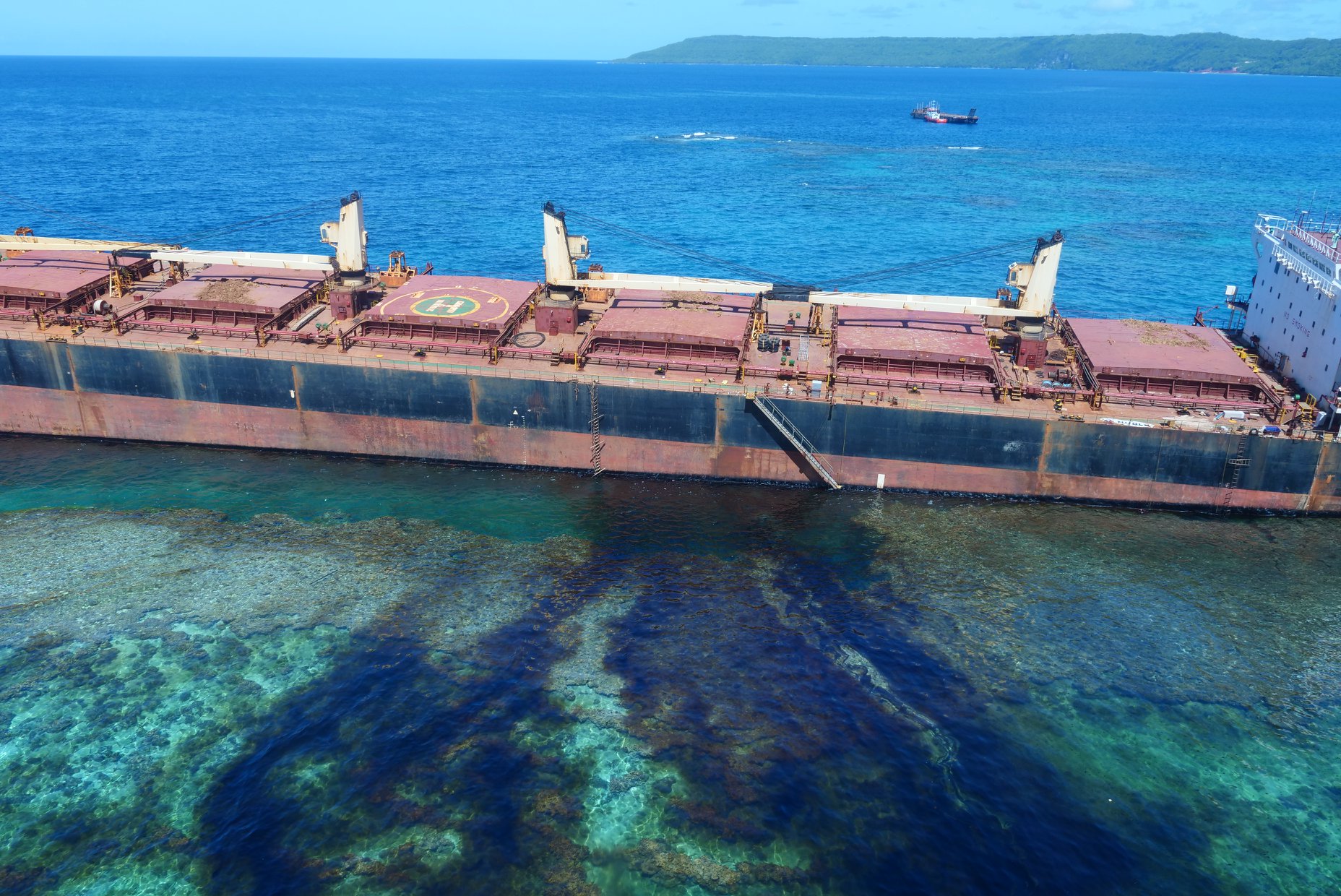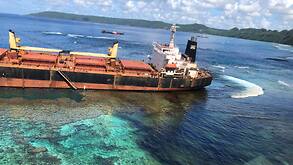One month ago today, Cyclone Oma drove a mining ship laden with up to 600 tonnes of oil onto a reef at Rennell Island – the largest raised coral atoll in the world. Experts have suggested marine safety codes were flouted and the result could be the Solomon Islands’ worst-ever environmental disaster.
In the midst of a fiercely fought election campaign in the Solomon Islands, it could be expected that this calamity would be the focus of the nations’ attention. How did it occur and who is responsible?
Not a word about the disaster has been uttered publicly by the country’s politicians who are deep in campaigning mode. Not a peep from the Minister for Environment. Not a whisper from the Minister of Mines. Not a murmur from the Prime Minister. Foreign news coverage of the event has surpassed that of the sluggish local media.
Meanwhile, the Indonesian company responsible for mining in Rennell – the company that chartered the stricken vessel – continues to load its precious bauxite only a stone’s throw from the listing tanker, seemingly oblivious to the unfolding catastrophe. No one is stopping it.
What has transpired in the Solomon Islands tells us a number of things about a country that has been propped by Australia to the tune of $2billion (AUD) through the Regional Assistance Mission to Solomon Islands (RAMSI). It is a perfect case study in natural resource exploitation, poverty and weak governance. All elements are present: a long history of unsustainable logging, and now mining; a largely rural population who rely mainly on small-holder agriculture for their livelihoods and a dysfunctional government.
The deafening silence within the Solomon Islands is perversely rational
Solomon Islands’ politics is highly localised: direct relationships of MP-voter patronage dictate everything. It is characterised by widespread corruption, fueled by the country’s Asian-dominated logging, and now mining industries. There is a blurring between the two, as one-time loggers turn their hand to mining. Political and bureaucratic elites collude with third-rate companies whose definition of corporate social responsibility is to build a public road to a mining site. Environmental laws are disregarded, either deliberately or because public servants lack the ability to enforce them.
Against this backdrop, there are no incentives, indeed, there is no need, for any of Solomon Islands’ 50 fragmented national MPs to worry themselves about a mounting environmental catastrophe which government neglect and malfeasance has contributed to. Not one vote cast at April’s upcoming election will be made on the basis of what is transpiring in Rennell. The vast majority of voters simply have no interest in matters beyond the personal: the provision of corrugated iron roofing, given by a local MP, upon which a similarly gifted cheap solar panel can be affixed. And this too is completely rational given a historical failure of government service delivery and limited livelihood options. At a political level, no one will be held accountable for this disaster.

The incident has received minimal press coverage in Solomon Islands.
Australian High Commission, Solomon Islands
The change that won’t come
The gushing tanker has been only one highlight in Solomon Islands’ nascent mining industry over the last few weeks. In a tale far juicer than a leaky boat, the Solomon Islands’ Minister of Mines and the CEO of Australian mining minnow, Axiom, entered into a public slanging match. The ASX-listed company is close to realising its first shipment of nickel from Isabel, an island north of Rennell. Front page newspaper reporting in Solomon Islands, ignoring happenings in Rennell, have seen nboth men accuse each other of corruption. It is a risky strategy for Axiom, who must be hoping the Minister is not returned to a position of influence following the election.
The island’s only arable soil where locals grow their food continues to be scooped up and shipped off shore where the bauxite deposits are then removed.
This unsavoury spat demonstrates how, within the Solomons, the personal will always trump the national. While oil haemorrhages, the vexed question of how to address the fundamental problems underlying the Solomons’ natural resource sector continues to be ignored. And there are zero political repercussions for this; just as there have been none for the national government for foregoing much needed revenue by scrapping all export duties on bauxite in late 2016, and for quietly pulling out of the global standard for governance in minerals, the Extractive Industries Transparency Initiative, last year.
Back on Rennell, the island’s only arable soil where locals grow their food continues to be scooped up and shipped off shore where the bauxite deposits are then removed. Future generations’ valuable food gardens are vanishing. The trashing of an island once known for its pristine environment is reaching a crescendo, with the destruction of its marine environment now added to the list of woes. Despite this, there will be no change to Solomon Islands handling of its internationally recognised, and dwindling, natural resources. To do so would require the country to change its politics, something no one, voters and elected officials alike, is able to do.
Daniel Evans is a PhD candidate at the Coral Bell School at the Australian National University. His research focuses on contemporary Solomon Islands.
https://www.sbs.com.au/news/dateline/comment-this-oil-spill-is-the-solomon-islands-worst-ever-environmental-disaster-and-no-local-dares-say-a-word-here-s-why
